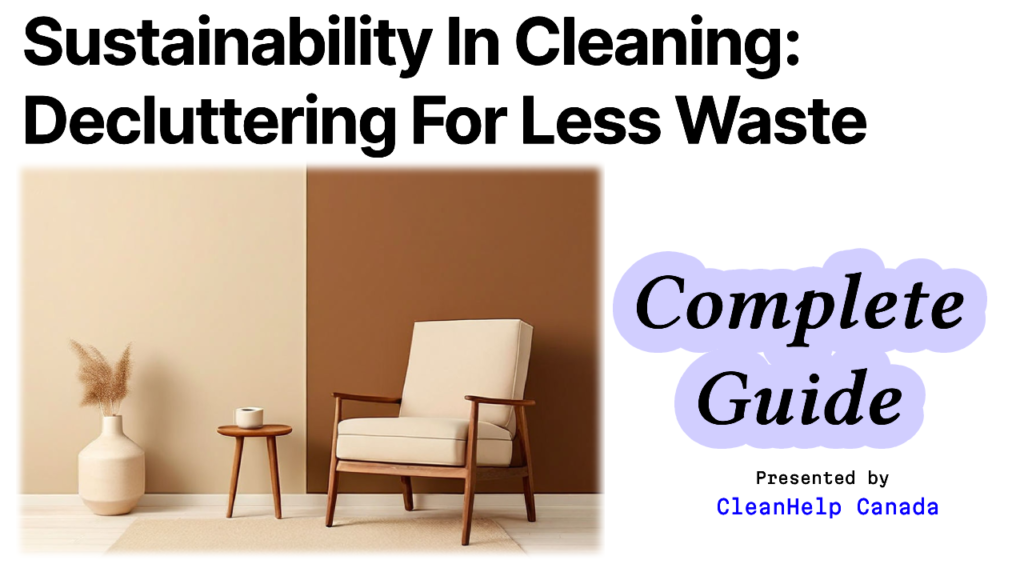In today’s environmentally-conscious world, sustainable cleaning practices are more important than ever. With increasing awareness of our impact on the planet, many people are turning to decluttering methods like those popularized by Marie Kondo and The Minimalists. These approaches not only help in maintaining a tidy home but also play a significant role in reducing waste and promoting a more sustainable lifestyle.
CleanHelp Canada, a leading cleaning service in London, Ontario, is committed to helping you achieve a cleaner and greener home by incorporating these principles into our eco-friendly cleaning services. Whether you’re looking for deep clean house cleaners or green house cleaners, we’ve got you covered.
The Importance of Sustainability in Cleaning
Sustainable cleaning extends beyond using eco-friendly products; it involves adopting practices that minimize waste and reduce environmental impact. As the effects of climate change and pollution become more evident, people are searching for ways to live more sustainably. Decluttering is an essential part of this journey, as it not only reduces waste but also ensures that what remains in your home is both purposeful and valuable. This is especially relevant in London, Ontario, where the community is increasingly embracing green practices.
How Decluttering Reduces Waste and Enhances Cleanliness
Decluttering isn’t just about discarding items; it’s about making thoughtful decisions about what to keep and what to let go. When done correctly, decluttering can significantly reduce waste by encouraging reuse, recycling, and mindful consumption. Here’s how:
- Less Waste, More Value: By focusing on items that add real value to your life, you’re less likely to buy unnecessary things, which naturally reduces waste.
- Efficient Recycling: Decluttering encourages recycling and donating items that no longer serve you but could be useful to others.
- Cleaner Spaces: With fewer items, your home becomes easier to clean and maintain, contributing to a healthier living environment.
Marie Kondo: Mindful Cleaning and Sustainability
The Origins of the KonMari Method

Marie Kondo, a Japanese organizing consultant and author, introduced the world to the KonMari method. This method emphasizes tidying by category rather than location and keeping only those items that “spark joy.” Her method, rooted in traditional Japanese values of mindfulness and simplicity, has gained global popularity since the publication of her book, The Life-Changing Magic of Tidying Up, in 2011. The KonMari method has inspired millions to embrace a more mindful approach to their belongings, ultimately leading to a more sustainable way of living.
The KonMari Method’s Impact on Sustainable Living
Marie Kondo’s KonMari method emphasizes keeping only those items that “spark joy.” This approach naturally leads to a reduction in the number of possessions, which in turn reduces waste. By encouraging people to carefully consider each item they own, the KonMari method supports a more sustainable lifestyle where less is more.
In London, Ontario, where seasonal changes can influence home maintenance, this method is particularly useful. As fall approaches and the city transitions to cooler weather, decluttering your wardrobe and home can help you prepare for the season with a cleaner, more organized space.
Reducing Waste Through Intentional Cleaning
Marie Kondo’s method aligns perfectly with sustainable cleaning practices. By regularly assessing your belongings, you’re less likely to accumulate unnecessary items, reducing the need for frequent decluttering. This approach also promotes mindful purchasing habits, where you only buy what you truly need, thus minimizing waste.
- Joyful Living: The focus on joy leads to a more positive relationship with your possessions, reducing the temptation to buy things impulsively.
- Sustainable Disposal: The KonMari method encourages the responsible disposal of items, whether through recycling, donating, or repurposing, all of which contribute to sustainability.
The Minimalists: Living with Less for a Cleaner Planet
The History of Minimalism

Minimalism, as a lifestyle, emerged in the post-World War II era, particularly gaining traction in the United States during the 1960s and 1970s. The movement was a response to the increasing consumerism of the time, promoting the idea that less is more. The Minimalists, Joshua Fields Millburn and Ryan Nicodemus, brought this philosophy to mainstream consciousness with their documentary and books, encouraging people to live with only the essentials. Their approach to minimalism focuses on finding happiness and fulfillment not in material possessions but in experiences and relationships.
How Minimalism Promotes Sustainable Cleanliness
The Minimalists advocate for a lifestyle centered around owning fewer possessions, which naturally leads to a reduction in waste and a cleaner living environment. By prioritizing quality over quantity, minimalism supports sustainable cleaning by reducing the demand for resources and the volume of waste produced.
For residents of London, Ontario, minimalism can be a practical approach to managing the fluctuating weather conditions. As the city prepares for the fall season, embracing minimalism can help streamline your home, making it easier to clean and maintain throughout the colder months.
Reducing Environmental Impact Through Decluttering
Minimalism isn’t just about reducing clutter; it’s about reducing your environmental footprint. Here’s how:
- Less Consumption: With fewer items, you consume less, which means less production, packaging, and eventually, less waste.
- Efficient Cleaning: Fewer possessions make cleaning faster and more efficient, reducing the need for excessive cleaning products and contributing to a more sustainable environment.
A Comparative Sustainability Analysis
Which Method is More Sustainable?
When comparing the sustainable cleaning practices of the KonMari method and minimalism, both have their strengths. However, each offers a unique approach to reducing waste:
- KonMari Method: Ideal for those who seek a joyful connection with their possessions and are looking to declutter in a mindful, reflective manner.
- Minimalism: Best for individuals who want to significantly reduce their environmental impact by owning and consuming less overall.
In terms of sustainability, minimalism might have a slight edge due to its emphasis on reducing consumption from the start. However, the KonMari method’s focus on intentional living also supports long-term sustainability by encouraging mindful ownership and disposal.
Cleaning Practices That Align with Each Approach
- For KonMari Practitioners: Regularly review your possessions and clean as you go, focusing on maintaining only what sparks joy.
- For Minimalists: Simplify your cleaning routine by using multi-purpose, eco-friendly cleaning products that align with a minimalist lifestyle.
Global Movement Towards Sustainable Cleanliness
International Trends in Sustainable Cleaning and Decluttering
Globally, there is a growing trend towards sustainable living, with many people adopting decluttering methods like those of Marie Kondo and The Minimalists. This movement is driven by a desire to live more intentionally, reduce waste, and create cleaner, more organized spaces.
Countries around the world are seeing a rise in the popularity of these methods, with people increasingly recognizing the link between decluttering, cleanliness, and environmental sustainability. Whether in urban centers or rural areas, the shift towards minimalism and mindful living is helping to reduce waste and promote a cleaner planet.
The Role of Decluttering in Global Waste Reduction
Decluttering plays a crucial role in global waste reduction by encouraging people to be more intentional about their consumption and disposal habits. As more individuals embrace these methods, the collective impact on waste reduction becomes significant, contributing to a cleaner, more sustainable world.
CleanHelp Canada’s Commitment to Sustainability
Eco-Friendly Cleaning Services
At CleanHelp Canada, we understand the importance of sustainable cleaning. Our eco-friendly cleaning services are designed to help you maintain a clean and organized home without compromising the environment. We use environmentally safe products and practices that align with both the KonMari method and minimalism.
- Green House Cleaners: Our commitment to sustainability is reflected in our choice of cleaning products, which are eco-friendly and safe for both your home and the environment.
- Deep Clean House Cleaners: For those who need a thorough cleaning, our services ensure that your home is not only spotless but also cleaned in a way that supports your sustainability goals.
How We Incorporate Sustainability in Our Cleaning Practices
- Green Cleaning Products: We use eco-friendly cleaning products that are safe for you and the environment.
- Waste Reduction: Our cleaning methods focus on reducing waste, whether through responsible disposal of cleaning materials or minimizing the use of single-use products.
- Customized Services: We tailor our services to support your decluttering efforts, whether you’re following the KonMari method or embracing minimalism.
Conclusion: Achieving a Clean and Sustainable Home in Canada
Decluttering with the KonMari method or adopting minimalism can significantly enhance your home’s cleanliness and sustainability. By reducing waste and adopting mindful cleaning practices, you not only create a more organized living space but also contribute to a cleaner planet. CleanHelp Canada is here to support your journey towards a sustainable home, offering eco-friendly cleaning services that align with your values. Whether you’re looking for deep clean house cleaners or green house cleaners, we’ve got you covered. Visit CleanHelp Canada today to learn more about how we can help you achieve a clean and sustainable home in London, Ontario.
